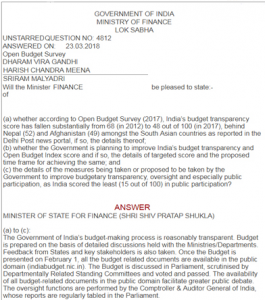No wiggle room for public participation in budgetary process
Growing pitch for budget transparency calls for improving public and civil society participation.

New Delhi:The yearly release of the Union and the State budgets in India come as no less than a surprise to its citizens. Yet, Shiv Pratap Shukla, MoS Finance, declares Indian government’s budget-making process as ‘reasonably transparent’. This declaration comes as a response to the Delhi Post’s article on India’s ranking in the Open Budget Survey 2017 results. The article was quoted and raised in the Lok Sabha by MPs Harish Chandra Meena, DharamVira Gandhi and Sriram Malyadri. Budget being a crucial and primary document which indicates the government’s plans and objectives for the socio-economic development of the country must be scrutinized at different stages. However, in India, the finance ministry still follows a closed budget formulation process, framing it as an exclusive affair of the executive. The absence of any consultations or recommendations from civil societies or other social organisations, other than trade unions, in the budgetary process acts as a hindrance towards a transparent democracy. In terms of formal oversight institutions, The Indian Legislature and Supreme Audit Institutions (SAIs) provide limited oversight of the budget with a score of 48 out of 100.
This Open Budget Survey score mainly reveals that the Indian legislature provides weaker oversight during the planning stage of the budget cycle than the execution and auditing stage. This raises an urgent need to ensure that the legislature holds a debate on budget policy prior to the tabling of the Executive’s Budget Proposal and approves recommendations for the upcoming budget.
“Oversight by legislators through the standing committees is appreciated, but the debate in Parliament on the budget and action taken on the committee reports is very weak and needs strengthening. Installing a Parliamentary Budget Office (PBO) which would provide independent and impartial assistance to MPs to engage with budgets will be a possible solution to this,”
Ravi Duggal, Country Coordinator and Senior Program Officer, International Budget Partnership.
Interestingly, in the recent years, when corruption cases have become the new norm, global leaders have been pitching for a more open and transparent government proceedings in all sectors. While the UPA government ignored transparency, leading to corruption cases and their consequent dethroning, the current BJP government imitates similar policies by undermining the public participation in budget-making process.
“Once the Budget is presented on February 1, all the budget-related documents are available in the public domain (indiabudget.nic.in). The Budget is discussed in Parliament, scrutinised by Departmentally Related Standing Committees and voted and passed. The availability of all budget-related documents in the public domain facilitates greater public debate,”
MoS Finance, Shiv Pratap Shukla, to question raised by three MPs in Lok Sabha.
From the very drafting till the tabling of the Union Budget in India, public participation remains a mere phrase with no importance. As stated by the MoS Finance, all the budget-related documents are made available to the public post-budget tabling, and execution and public debates echo only in the four walls of the newsrooms. Instead of addressing the need for better public/civil society participation in budget-making process, the response from the finance ministry appears to dismiss or disregard the importance of public participation.
Also read: Open Budget Survey: Global Budget transparency stalls, India shows moderate growth
Speaking at the recently held National Legislators Conference in parliament, PM Modi said: “Public participation always helps. Wherever officials have worked with people and involved them with the development process, the results are transformative.” Well, public participation does not end with cleaning roads, paying taxes and using digital payment methods. If a “pro-people” government expects its citizens to participate in its schemes and policies, then it should first make sure that the public and civil societies are given opportunities in decision-making in real sense by giving them power.
